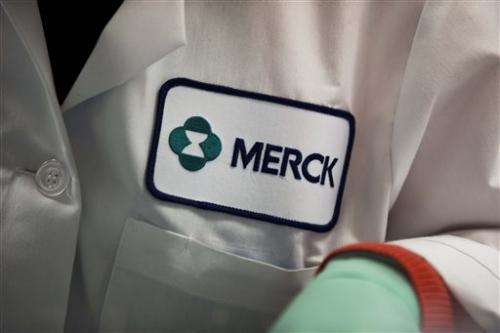Merck to pay $3.85B for hepatitis C drug developer

Merck & Co. will spend about $3.85 billion for Idenix Pharmaceuticals Inc., a small company developing hepatitis C medicines that, together with Merck's experimental drugs, could produce lucrative combo therapies that quickly cure most patients with the blood-borne virus afflicting tens of millions.
The price for the deal announced Monday—a per-share bid more than triple Friday's closing price for Cambridge, Massachusetts-based Idenix—seems high. However, the latest hepatitis C medicines command very high prices, the number of patients keeps rising and Merck was bidding against rivals.
Hepatitis C has become one of the hottest categories in drug research as companies race to develop a combination therapy without injections and debilitating side effects. Some have had their promising candidates fail after extensive testing, due to dangerous side effects, but Gilead Sciences Inc. is already raking in billions of dollars from its groundbreaking new drug, Sovaldi.
Merck, based in Whitehouse Station, New Jersey, said it will spend $24.50 in cash for each Idenix share. Idenix closed at $7.23 on Friday, then more than tripled at Monday's opening bell.
The boards of both companies have approved the deal, which should close in the third quarter.
"Idenix has established a promising portfolio of hepatitis C candidates based on its expertise in (certain) technologies," Merck's research head, Dr. Roger Perlmutter, said in a statement.
Three Idenix experimental drugs have reached human testing and one, samatasvir, is in mid-stage testing. It's in a new drug class called NS5A inhibitors, which disrupt various stages of the virus life cycle. Two other drugs, known as IDX21437 and IDX21459, are in a class called nucleotide prodrugs, which stop the virus from producing genetic material needed to copy itself.
Merck has been testing two drugs together, MK-5172 and MK-8742, that the Food and Drug Administration has deemed a breakthrough therapy. Merck will soon start late-stage testing of the two drugs together and presumably will study them in combinations with the Idenix drugs.
About 4.4 million Americans and an estimated 170 million people worldwide have chronic hepatitis C, the leading cause of liver cancer and, in wealthy countries, the top reason for liver transplants. In the U.S., it kills more than 16,000 people a year.
While most people infected don't know it because there are no obvious symptoms, a growing number have been identified and started treatment in the last few years as more effective medicines have been approved. That number is expected to grow as the U.S. population ages and patients infected decades ago through intravenous drug use, or from blood transfusions before the early 1990s, are diagnosed.
Merck has been a major player in hepatitis C since acquiring Schering-Plough in 2009. Back then, treatment was limited to twice-a-day pills called ribavirin and self-injections of a long-acting, synthetic form of immune system protein interferon. Treatment often lasted 48 weeks, only about 40 percent of patients were cured, and flu-like symptoms and other side effects of the interferon kept many patients from completing treatment.
In 2011, the FDA approved two drugs in a class called protease inhibitors, Merck's Victrelis and Incivek from Vertex Pharmaceuticals. Those are taken with ribavirin and interferon, work by blocking an enzyme needed for copying the virus, and boost the cure rate to about 75 percent. But they require patients to take a dozen pills a day, and still endure flu-like side effects.
Last December, the FDA approved Gilead's once-a-day pill Sovaldi, which cures 80 percent to 90 percent of patients, without the interferon injections and side effects.
Physicians quickly embraced it, and Sovaldi racked up more than $2 billion in sales in its first full quarter on sale, considered the best new drug launch in history. That's mainly because of Sovaldi's high price, about $1,000 per pill, or $84,000 for a 12-week treatment course, which continues to draw criticism from patients, insurers and government.
Sovaldi appears poised to dominate the hepatitis C market, greatly outselling Johnson & Johnson's Olysio, approved about the same time. But there's plenty of room for Merck and others because Sovaldi can't be taken by some patients with multiple illnesses or certain hepatitis C subtypes.
In afternoon trading, Idenix shares climbed $16.76 to $23.99. Merck shares slipped 5 cents to $57.80.
Shares of another hepatitis C drug developer, Achillion Pharmaceuticals Inc., now seen as a potential takeover target, climbed 58 percent to $4.55.
© 2014 The Associated Press. All rights reserved.














